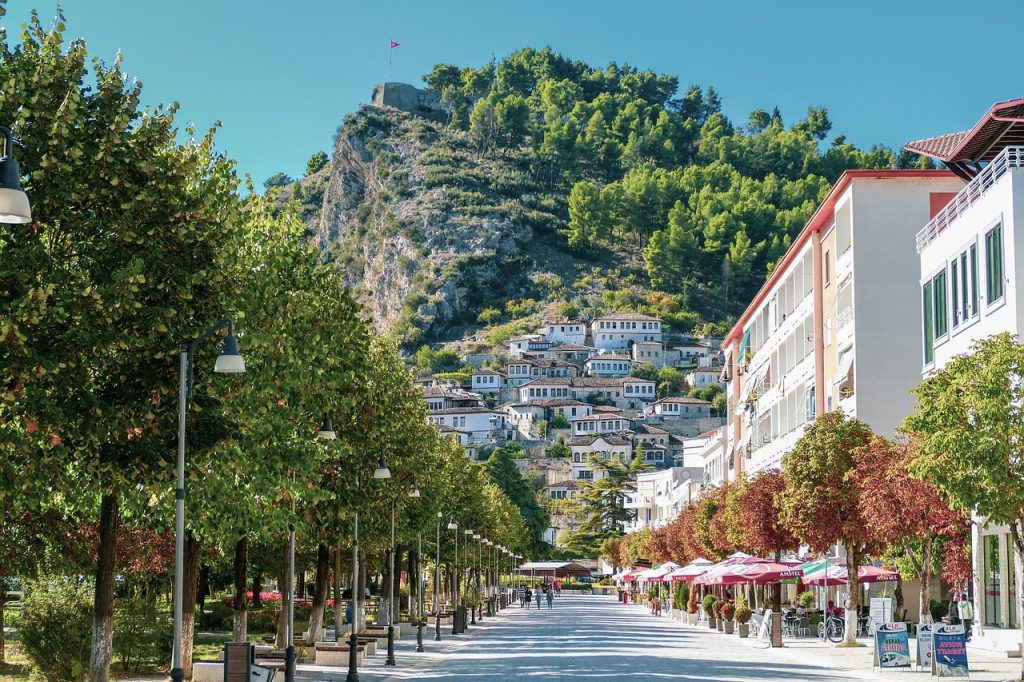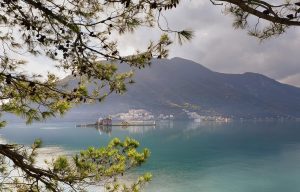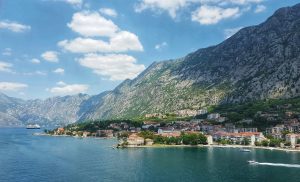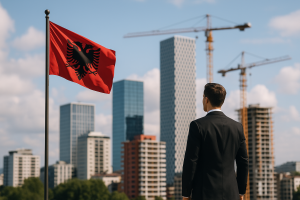Albania is known for its beautiful landscape and diverse cultural heritage which are recognized as gems of European tourism. Strategically positioned in the Western Balkans, the country has seen remarkable growth in tourism in recent years, with an estimated increase of 163% over the past four years. Furthermore, according to the UN Tourism Barometer, Albania has been recognized as the top-performing destination in Europe for 2023 and the fourth top-performing destination in the world.
With the promising projections for tourism, in addition to the boost in the local economy, the country has recently become a potential and attractive hub for foreign investments. The government is working continuously to provide sustainable and growth-driven policies, especially in the tourism sector, playing a key role in fostering an attractive investment climate.
This article will navigate through Albania’s tourism investment opportunities and will provide information about the country’s economy, the government’s efforts to create a favorable investment climate, incentive policies, and the potential of the tourism industry to attract foreign direct investments (FDI).
Why Invest in Albania?
When assessing Albania’s potential as a reliable investment partner, the following key aspects should be considered:
The country’s vision – Albania’s government is currently focused on economic growth, stability, and regional influence, as it works toward creating a positive environment for foreign investments. The country has a clear strategy to attract investors, demonstrated by the establishment of the Albanian Investment Development Agency (AIDA). AIDA’s mission, primarily, is to advance the competitiveness of the private sector and promote foreign direct investment in the country.
Legislation Framework – Albania’s foreign investment regulations assist in creating a liberal and reformist investment climate. Albania encourages FDIs through a legal framework that allows 100% foreign ownership and offers specific investor protections under the Law “On Foreign Investment.” Ongoing reforms, fiscal consolidation, infrastructure investments, and educational improvements are some of the policies currently under governmental care. Additionally, the “Strategic Investment Law” offers strong legal safeguards for international investors who wish to do business in the country.
Growing Economy – Albania’s diverse economy relies on substantial sectors such as manufacturing, agriculture, and recently tourism. It is characterized by accelerated economic growth rates, proving resilience and adaptability. In the 2024 Report delivered by the International Monetary Fund (IMF), in the context of emerging markets and developing economies, where Albania is categorized, growth is expected to remain at 4.1% in 2024 and rise to 4.2% in 2025.
A closer examination of GDP levels reveals that in 2023, the GDP reached approximately USD 23 billion, and the growth projections for 2024 and 2025 remain optimistic, with an expected increase of 3.2%. While the agriculture and industry sectors’ overall contribution to the GDP are respectively 19% and 21%, the largest contributor remains the service industry at 47%. Notably, tourism expenditure alone accounted for 17.2% of the country’s GDP in 2022.
Young and Educated Population– The population’s average age currently stands at 38.8 years, while 46% of the population is under 35 years old. Albanian people, highly educated and skilled, remain a stronghold toward fostering business. Currently, the business activity data provided by SME Policy Index Western Balkans and Turkey 2022 indicates that the number of SMEs per 1,000 inhabitants in Albania has increased by 12.3%. In addition, the research study European Innovation Scoreboard 2023 , that which provides with a comparative assessment of the research and innovation (R&I) performance of countries, qualified Albania as an Emerging Innovator with a performance of 41.1%. Albanian people are known, among others, for their foreign language skills, with English, Italian, and Greek being widely spoken nationally.
Increasing Foreign Investments Flow – In the first quarter of 2024, FDIs in Albania reached €354 million, representing a 15.3% increase from the previous year, adding €47 million in investments. The main sources of these investments are from Italy, Austria, Turkey, Switzerland, the Netherlands, Germany, and Kosovo, spanning sectors such as real estate, electricity, and industries such as mining, insurance, and scientific activities.

Tourism Investment in Albania
An Overview of Tourism Data
Tourism in Albania has undergone a remarkable transformation in recent years. The country welcomed a record 5.9 million international tourists in 2018, marking its first major milestone. After the COVID-19 pandemic, tourism recovered quickly, and in 2023, Albania experienced an unprecedented surge, attracting 10.1 million visitors for the first time in its history.
According to the data provided by the Airports Council International, Albania led the world in passenger number growth during April-June 2024, with a remarkable increase of 259.4% in the second quarter of 2024.
Regarding tourism spending, the country’s data show growth and a positive rate, with visitor spending increasing from USD 1.2 billion in 2020 to USD 2.5 billion in 2021. In 2022 it reached a record USD 3.3 billion, highlighting the resilience of Albania’s tourism sector and its contribution to economic growth. Tourism has become a key pillar of Albania’s economy and steadily has become more relevant over the years. For example, in 2014, tourism directly contributed 2% to the GDP, and by September 2023, this figure rose to 3.8%.
Investments in the Tourism Industry
Tourism investment in Albania is of considerable relevance due to the country’s strategic location, richness of nature, and growing tourism sector. Albania’s diverse landscapes and rich cultural heritage have allowed for the development of various types of tourism spanning from the Adriatic and Ionian coastlines to alpine adventures in the north, as well as the exploration of historic castles and religious monuments from Orthodox, Catholic, and Islamic traditions.
Albania’s successful experience with both local and international tourists has led the country to carefully consider the future of tourism and develop strategies to further grow the sector. The Strategic Investment Law specifically highlights tourism as a key area for foreign investment, with Article 8 emphasizing its importance. Between 2016 and 2023 the pipeline of strategic investment projects amounted to 21 projects, totaling EUR 3,090 million and generating approximately 16,900 new jobs.
To learn more about the specifics of each of the twenty-one projects click here.
Investment in Albania’s tourism sector is strongly focused on developing high-end resorts and luxury accommodations. Recognizing this potential, the Albanian government is actively promoting the establishment of five-star resorts and boutique hotels serving upscale clients. Today, Albania hosts 17 global hotel brands, including Melia, Marriott, Movenpick-Accor, Mercure-Accor, Maritim, Radisson, Hyatt, Hilton, Pullman-Accor, and others. Remarkably, none of these brands were present in the country just five years ago.
Of particular relevance to Albania’s tourism, is the emergence of the recent eco-tourism projects, due to Albania’s rich natural environment. Albania is home to several UNESCO World Heritage Sites, including the ancient city of Butrint and the medieval towns of Gjirokastër and Berat, attracting travelers culturally and environmentally conscious travelers.
The Albanian government has made eco-tourism a key part of its tourism strategy, focusing on protecting natural and cultural heritage while encouraging sustainable growth. The creation of protected areas like the Vjosa Wild River National Park shows Albania’s commitment to preserving its natural resources while building responsible tourism infrastructure.
Incentives Policies Available
Currently, accommodation facilities such as “Four and five-star hotels, with special status” and the holders of an internationally recognized and registered trademark are exempted from tax on impact on infrastructure and tax on buildings, which you can learn more by clicking here. Additionally, they benefit from a reduced VAT rate of 6%, while structures that receive special statutes are exempted from corporate income tax for 10 years.
Other incentives include the disposal of state immovable property, the availability of state real estate (also through a symbolic EUR 1 contract) for a period of up to 99 years, and the establishment of touristic ports or permanent pits serving as supporting infrastructure for tourist structures.
The government’s focus on sustainability, improved infrastructure, and reducing seasonality makes Albania ideal for year-round tourism investments.
If you’re interested in learning more about legal and financial implications when considering investing in the country, seeking professional advice is highly recommended. Our firm specializes in international taxation, and our team is ready to assist with any related matters. We can connect you with top professionals to support your business activities in Albania, if necessary. Please feel free to contact us.




